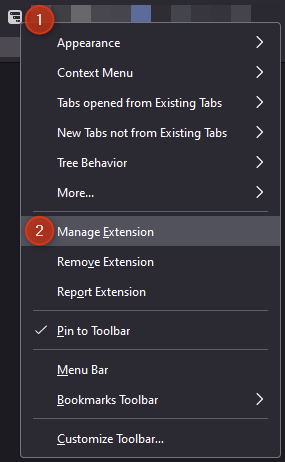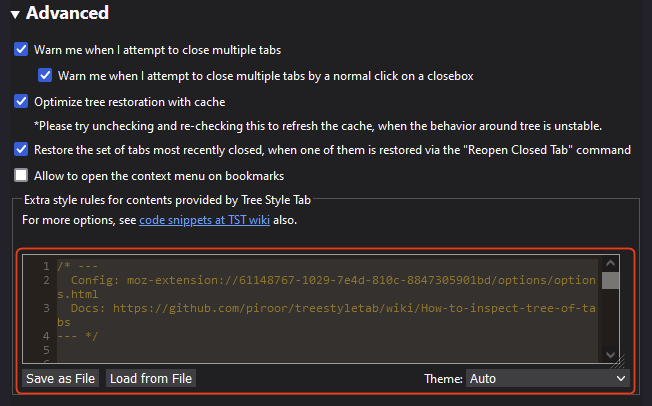Hide the Tab Bar
{{@9#bkmrk-callout-danger-NoResponsibilityDisclaimer-5wod5ufe}}
Introduction
Hiding the Mozilla Firefox tab bar is useful when used in conjunction with the Tree Style Tabs plugin. The following changes heavily rely on custom CSS from MrOtherGuy/firefox-csshacks. This changes include:
- Create a placeholder for the Firefox window controls (e.g. minimize, maximize, and close buttons) using
window_control_placeholder_support.css. - Hide the Firfox horizontal tabs toolbar, since we are now relying on the Tree Style Tabs addon using
hide_tabs_toolbar.css. - Auto hide the Firefox sidebar using
autohide_sidebar.css. - Combining the above three bullet points + hiding the sidebar title using
userChrome.css.
Requirements
Instructions
Enable Custom CSS
- Visit
about:config. - Search
toolkit.legacyUserProfileCustomizations.stylesheets. - Toggle it, making the value
true.
Apply Custom CSS
- In Firefox, navigate to about:support. Take note of the Profile Folder path.
If needed, all profiles can be managed via about:profiles.
- In Windows File Explorer, navigate to the Root Directly path.
e.g.
C:\Users\<UserName>\AppData\Roaming\Mozilla\Firefox\Profiles\<YourFirefoxProfile>\. - Create a chrome folder.
e.g.
C:\Users\<UserName>\AppData\Roaming\Mozilla\Firefox\Profiles\<YourFirefoxProfile>\chrome. - In the chrome folder, create or download the following CSS files:
- Create window_control_placeholder_support.css. Use the following contents:
/* Source file https://github.com/MrOtherGuy/firefox-csshacks/tree/master/chrome/window_control_placeholder_support.css made available under Mozilla Public License v. 2.0 See the above repository for updates as well as full license text. */ /* Creates placeholders for windowcontrols */ /*controls. This is a supporting file used by other stylesheets*/ /* This stylesheetand ispretty muchmostly unnecessary if window titlebar isenabledenabled.*/ /* This file shouldShould preferably be imported before otherstylesheetsstylesheets,*/because/*someDefaultsvaluesforinwindowthiscontrolsstyleonareRIGHTdeliberatelysideoverriddenofbytheotherwindowstyles. */ /* Modify these values to match your preferences*/These:root:is([tabsintitlebar],reserve[sizemode="fullscreen"]) { --uc-window-control-width: 138px; /* Space reserved for window controls (Win10) */ /* Extraextra spacereservedon both sides of the nav-bar to be able to drag the window */ :root:is([tabsintitlebar], [sizemode="fullscreen"]) { --uc-window-drag-space-pre: 30px; /* left side*/ --uc-window-drag-space-post: 30px; /* right side*/ } :root:is([tabsintitlebar][sizemode="maximized"], [sizemode="fullscreen"]) { --uc-window-drag-space-pre: 0px; /* Remove pre space */ } /* Default width - used on Windows10+ */ :root:is([tabsintitlebar], [sizemode="fullscreen"]) { --uc-window-control-width: 138px; } @media (-moz-platform: windows-win7), (-moz-platform: windows-win8){ :root:is([tabsintitlebar], [sizemode="fullscreen"]) { --uc-window-control-width: 105px; } } /* On linux set width based on number of caption buttons. One button */ @media (-moz-gtk-csd-available)minimize-button), (-moz-gtk-csd-maximize-button), (-moz-gtk-csd-close-button) { :root:is([tabsintitlebar],[sizemode="fullscreen"]) { --uc-window-control-width: 28px; } } /* Two buttons */ @media (-moz-gtk-csd-minimize-button) and (-moz-gtk-csd-maximize-button), (-moz-gtk-csd-minimize-button) and (-moz-gtk-csd-close-button), (-moz-gtk-csd-maximize-button) and (-moz-gtk-csd-close-button) { :root:is([tabsintitlebar],[sizemode="fullscreen"]) { --uc-window-control-width: 56px; } } /* Three buttons */ @media (-moz-gtk-csd-minimize-button) and (-moz-gtk-csd-maximize-button) and (-moz-gtk-csd-close-button) { :root:is([tabsintitlebar],[sizemode="fullscreen"]) { --uc-window-control-width: 84px; } } @media (-moz-platform: macos){ :root:is([tabsintitlebar],) { --uc-window-control-width: 72px; } :root:is([tabsintitlebar][sizemode="fullscreen"]) { --uc-window-control-width:72px;0; } } .titlebar-buttonbox, #window-controls{buttonbox{ color: var(--toolbar-color) } :root[sizemode="fullscreen"] .titlebar-buttonbox-container{ display: none } :root[sizemode="fullscreen"]#navigator-toolbox { position: relative; } :root[sizemode="fullscreen"]#TabsToolbar > .titlebar-buttonbox-container:last-child, :root[sizemode="fullscreen"] #window-controls{child{ position: absolute; display: flex; top: 0; right:0; height: 40px; } :root[sizemode="fullscreen"] #TabsToolbar > .titlebar-buttonbox-container:last-child, :root[uidensity="compact"][sizemode="fullscreen"] #window-controls{child{ height: 32px } #nav-bar{ border-inline: var(--uc-window-drag-space-pre,0px) solid transparent; border-inline-style: solid !important; border-right-width: calc(var(--uc-window-control-width,0px) + var(--uc-window-drag-space-post,0px)); background-clip: border-box !important; } /* Rules for window controls on left layout */ @media (-moz-bool-pref: "userchrome.force-window-controls-on-left.enabled"), (-moz-gtk-csd-reversed-placement), (-moz-platform: macos){ :root[tabsintitlebar="true"] #nav-bar{ border-inline-width: calc(var(--uc-window-control-width,0px) + var(--uc-window-drag-space-post,0px)) var(--uc-window-drag-space-pre,0px) } :root[sizemode="fullscreen"] #TabsToolbar > .titlebar-buttonbox-container:last-child, :root[sizemode="fullscreen"] #window-controls{child{ right: unset } } @media (-moz-bool-pref: "userchrome.force-window-controls-on-left.enabled"){.titlebar-buttonbox-container{ order: -1 !important; } .titlebar-buttonbox{ flex-direction: row-reverse; } } /* This pref can be used to force window controls on left even if that is not normal behavior on your OS */ @supports -moz-bool-pref("userchrome.force-window-controls-on-left.enabled"){ :root[tabsintitlebar="true"] #nav-bar{ border-inline-width: calc(var(--uc-window-control-width,0px) + var(--uc-window-drag-space-post,0px)) var(--uc-window-drag-space-pre,0px) } :root[sizemode="fullscreen"] #TabsToolbar > .titlebar-buttonbox-container:last-child, :root[sizemode="fullscreen"] #window-controls{ right: unset; }.titlebar-buttonbox-container{ order: -1 !important; } .titlebar-buttonbox{ flex-direction: row-reverse; } } - Create hide_tabs_toolbar.css. Use the following contents:
/* Source file https://github.com/MrOtherGuy/firefox-csshacks/tree/master/chrome/hide_tabs_toolbar.css made available under Mozilla Public License v. 2.0 See the above repository for updates as well as full license text. */ /* Hides tabs toolbar */ /* For OSX use hide_tabs_toolbar_osx.css instead */ /* Note, if you have either native titlebar or menubar enabled, then you don't really need this style. * In those cases you can just use: #TabsToolbar{ visibility: collapse !important } */ /* IMPORTANT */ /* Get window_control_placeholder_support.css Window controls will be all wrong without it */ :root[tabsintitlebar]{ --uc-toolbar-height: 40px; } :root[tabsintitlebar][uidensity="compact"]{ --uc-toolbar-height: 32px } #titlebar{ will-change: unset !important; transition: none !important; opacity: 1 !important; } #TabsToolbar{ visibility: collapse !important } :root[sizemode="fullscreen"] #titlebar{ position: relative } :root[sizemode="fullscreen"] #TabsToolbar >:is(#window-controls,.titlebar-buttonbox-container){container{ visibility: visible !important; z-index: 2; } :root:not([inFullscreen]) #nav-bar{ margin-top: calc(0px - var(--uc-toolbar-height,0px)); } :root[tabsintitlebar] #toolbar-menubar[autohide="true"]{ min-height: unset !important; height: var(--uc-toolbar-height,0px) !important; position: relative; } #toolbar-menubar[autohide="false"]{ margin-bottom: var(--uc-toolbar-height,0px) } :root[tabsintitlebar] #toolbar-menubar[autohide="true"] #main-menubar{ flex-grow: 1; align-items: stretch; background-attachment: scroll, fixed, fixed; background-position: 0 0, var(--lwt-background-alignment), right top; background-repeat: repeat-x, var(--lwt-background-tiling), no-repeat; background-size: auto 100%, var(--lwt-background-size, auto auto), auto auto; padding-right: 20px; } :root[tabsintitlebar] #toolbar-menubar[autohide="true"]:not([inactive]) #main-menubar{ background-color: var(--lwt-accent-color); background-image: linear-gradient(var(--toolbar-bgcolor,--toolbar-non-lwt-bgcolor); background-clip: padding-box; border-right: 30px solid transparent; border-image: linear-gradient(to left, transparent,,var(--toolbar-bgcolor,--toolbar-non-lwt-bgcolor)),30px)var(--lwt-additional-images,none),20var(--lwt-header-image,/none);30pxmask-image: linear-gradient(to left, transparent, black 20px); } #toolbar-menubar:not([inactive]){ z-index: 2 } #toolbar-menubar[autohide="true"][inactive] > #menubar-items { opacity: 0; pointer-events: none; margin-left: var(--uc-window-drag-space-pre,0px) } - Create autohide_sidebar.css. Use the following contents:
Lines 8, 9, 10 have been modified to my liking.
/* Source file https://github.com/MrOtherGuy/firefox-csshacks/tree/master/chrome/autohide_sidebar.css made available under Mozilla Public License v. 2.0 See the above repository for updates as well as full license text. */ /* Show sidebar only when the cursor is over it */ /* The border controlling sidebar width will be removed so you'll need to modify these values to change width */ #sidebar-box{ --uc-sidebar-width: 40px; --uc-sidebar-hover-width: 450px; --uc-autohide-sidebar-delay: 300ms; /* Wait 0.3s before hiding sidebar */ --uc-autohide-transition-duration: 115ms; --uc-autohide-transition-type: linear; position: relative; min-width: var(--uc-sidebar-width) !important; width: var(--uc-sidebar-width) !important; max-width: var(--uc-sidebar-width) !important; z-index:1; } #sidebar-box[positionend]{ direction: rtl } #sidebar-box[positionend] > *{ direction: ltr } #sidebar-box[positionend]:-moz-locale-dir(rtl){ direction: ltr } #sidebar-box[positionend]:-moz-locale-dir(rtl) > *{ direction: rtl } #main-window[sizemode="fullscreen"] #sidebar-box{ --uc-sidebar-width: 1px; } #sidebar-splitter{ display: none } #sidebar-header{ overflow: hidden; color: var(--chrome-color, inherit) !important; padding-inline: 0 !important; } #sidebar-header::before, #sidebar-header::after{ content: ""; display: flex; padding-left: 8px; } #sidebar-header, #sidebar{ transition: min-width var(--uc-autohide-transition-duration) var(--uc-autohide-transition-type) var(--uc-autohide-sidebar-delay) !important; min-width: var(--uc-sidebar-width) !important; will-change: min-width; } #sidebar-box:hover > #sidebar-header, #sidebar-box:hover > #sidebar{ min-width: var(--uc-sidebar-hover-width) !important; transition-delay: 0ms !important; } .sidebar-panel{ background-color: transparent !important; color: var(--newtab-text-primary-color) !important; } .sidebar-panel #search-box{ -moz-appearance: none !important; background-color: rgba(249,249,250,0.1) !important; color: inherit !important; } /* Add sidebar divider and give it background */ #sidebar, #sidebar-header{ background-color: inherit !important; border-inline: 1px solid rgb(80,80,80); border-inline-width: 0px 1px; } #sidebar-box:not([positionend]) > :-moz-locale-dir(rtl), #sidebar-box[positionend] > *{ border-inline-width: 1px 0px; } /* Move statuspanel to the other side when sidebar is hovered so it doesn't get covered by sidebar */ #sidebar-box:not([positionend]):hover ~ #appcontent #statuspanel{ inset-inline: auto 0px !important; } #sidebar-box:not([positionend]):hover ~ #appcontent #statuspanel-label{ margin-inline: 0px !important; border-left-style: solid !important; }
- Create window_control_placeholder_support.css. Use the following contents:
- In the chrome folder, create userChrome.css. Use the following contents:
@import url(window_control_placeholder_support.css); @import url(hide_tabs_toolbar.css); @import url(autohide_sidebar.css); #sidebar-header { visibility: collapse !important; } - Exit and relaunch Firefox to apply the changes.
Customization
Sidebery
Custom CSS
In the Sidebery Settings, add the following CSS to the "Styles editor".
#root.root {--tabs-lvl-opacity: 0.66;}
#root.root {--tabs-activated-bg: DeepSkyBlue;}
#root.root {--tabs-activated-fg: black;}Tree Style Tabs
Spaced and Colored Tab Groups
- In the toolbar, Right-click on the pinned Tree Style Tab icon and select Manage Extension:
- Select the Options tab:
- Scroll down to the Advanced section and locate Extra style rules for contents provided by Tree Style Tab:
Remove all existing CSS and paste the following:
/* --- Config: moz-extension://61148767-1029-7e4d-810c-8847305901bd/options/options.html Docs: https://github.com/piroor/treestyletab/wiki/How-to-inspect-tree-of-tabs --- */ #tabbar { background: linear-gradient(to bottom, #342735 0%, #4B5670 50%); } /* --- Tab Styling --- */ .tab tab-item-substance { background: rgba(0,0,0, .5); border-color: rgba(255,255,255,.3); } /* Active tabs */ .tab.active { background: rgba(0,0,0,.1) } .tab.active[data-level="0"]:not([data-child-ids]) { background: rgba(255,255,255,.2); } .tab.active tab-item-substance { background: transparent; } /* Hovered tabs */ .tab tab-item-substance { transition: 100ms ease background; } .tab:hover tab-item-substance { background: rgba(255,255,255,.2); transition: unset; } /* --- Fix upper and bottom borders between tabs --- */ .tab:not(.collapsed) { margin-top: -1px; margin-bottom: 0; } /* --- Add spacing around tab groups --- */ .tab:not([data-level="0"]) + .tab[data-level="0"], .tab[data-level="0"][data-child-ids] { margin: 12px 0 0; } /* Not if very first tab */ .tab:first-child { margin-top: 0 !important; } /* --- Add tab group indent coloring --- */ .tab[data-level="0"]:before { content: ""; width: 100vw; height: 60vh; background: #342735; position: absolute; top: -12px; left: 0; z-index: -1; } .tab[data-level="0"]:after { content: ""; width: 100vw; height: 60vh; background: linear-gradient(to bottom, #342735 0%, #4B5670 50%); position: absolute; top: 0; left: 0; z-index: -1; } /* Needed to clean bg if last tab is not level 0 */ .after-tabs > .vbox:after { content: ""; width: 100vw; height: 100vh; background: linear-gradient(to bottom, #342735 0%, #4B5670 50%); position: absolute; top: 0; left: 0; z-index: -1; } /* Color based on parent last id digit */ .tab[data-level="0"][data-child-ids][id$="1"]:after { background: #c62828; } .tab[data-level="0"][data-child-ids][id$="2"]:after { background: #ef6c00; } .tab[data-level="0"][data-child-ids][id$="3"]:after { background: #f9a825; } .tab[data-level="0"][data-child-ids][id$="4"]:after { background: #2e7d32; } .tab[data-level="0"][data-child-ids][id$="5"]:after { background: #0097a7; } .tab[data-level="0"][data-child-ids][id$="6"]:after { background: #1565c0; } .tab[data-level="0"][data-child-ids][id$="7"]:after { background: #673ab7; } .tab[data-level="0"][data-child-ids][id$="8"]:after { background: #ec407a; } .tab[data-level="0"][data-child-ids][id$="9"]:after { background: #8d6e63; } .tab[data-level="0"][data-child-ids][id$="0"]:after { background: #78909c; }SOURCE: https://gist.github.com/FabulousCupcake/9e74a35f4ef282cf90e37e11b260f6f5
Sources
- github.com - MyOtherGuy/firefox-csshacks
- github.com - FabulousCupcake/tst-colored-tab-groups.css
- reddit.com - Tree Style Tabs – Spaced and Colored Tab Groups
- superuser.com - Can I hide native tabs at the top of Firefox?
KB Change/Issue Log
yyyy/mm/dd - Title
Issue
N/A
Solution
N/A
KB Meta
| Page Includes | @9#bkmrk-callout-danger-NoResponsibilityDisclaimer-5wod5ufe |



